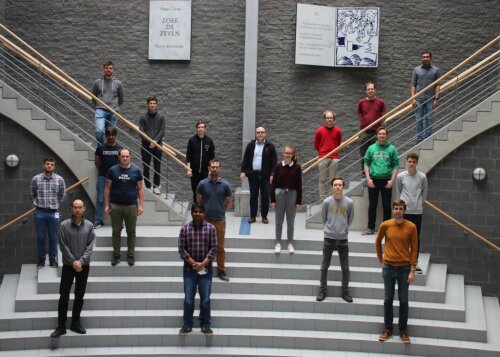Prof. Maes Group
The Maes group belongs to the research division Organic Synthesis (ORSY) of the Department of Chemistry and participates in several networks within UAntwerpen:
The BOF (Special Research Fund) Center of Excellence Sustainable Catalysis for Organic Chemistry (CASCH) and the IOF (Industrial Research Fund) Valorization Consortium on Sustainable Chemistry in Antwerp (InSusChem).
In the Maes group new sustainable synthetic methodologies are developed with a focus on homogeneous catalysis, organometallic chemistry, heterocyclic chemistry, and fine chemicals. A major research topic is the development of new synthetic methods aiming direct functionalization of challenging unreactive bonds. Initially, this research was solely focused on C-H bond functionalization but more recently has been extended to C-O, C-N and C-C bonds. The research on C-H bond functionalization (e.g. direct oxidation, arylation, vinylation) focuses on challenging C(sp3)-H bonds. The new topics dealing with C-O, C-N and C-C bond activation are primarily targeting renewable building blocks. Products obtained from biomass (in particular, phenol derivatives originating from lignin) through biorefineries require C-C and C-O defunctionalization into C-H, or direct transformation into C-C or C-X (heteroatom) bonds to access products of relevance to the chemical industry, hereby providing an alternative for a petrochemical industry. The C-N bond activation targets amides, including peptides. Further aspects of new sustainable synthetic methodologies include replacement of highly efficient but expensive and scarce precious metals (e.g. Ru, Rh, Ir or Pd) for homogeneous catalysis with cheaper and more abundant base metals (e.g. Cu, Fe, Ni) and organocatalysts. Special attention is given to the assessment of greenness of newly developed methodologies using quantitative Green Metrics. More information can be found in the description of the research lines and publications.

Research in the Prof. Maes group is focused on homogeneous transition metal catalysis and heterocyclic chemistry. There are a few major research lines:
- Direct Functionalization via Transition Metal-Catalyzed C-H Bond Activation
- Study of Fundamental Steps of Transition metal-Catalyzed Cross-coupling Reactions
- Transition Metal-catalyzed Reactions involving Isocyanides
- Recovery and Reuse of Noble Transition Metals
- Chemicals from Renewable Feedstock
To read more about specific research lines, use the menu on the left. See also the publication selection for more specific examples.